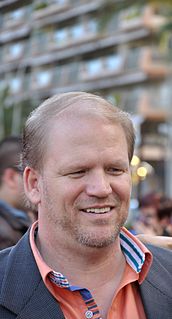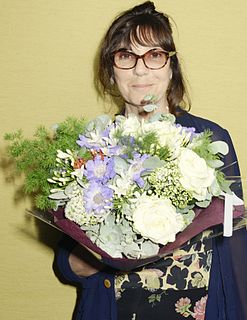A Quote by Danzy Senna
Writing New People I was thinking a lot about the era that I came of age - the 90's. Brooklyn, in particular, this moment when I lived there. The sense of possibility. I was also trying to find a way to write about Jonestown. I had read about it a lot and I had the sense that the story could really start to drive one over the edge.
Related Quotes
I had been really obsessed with Jonestown for a long time - many years - and had read everything there was to read about it, seen all the footage and the documentaries. I found it really chilling in a personal way - the question of people submitting all their personal power and agency and independent thought it the name of a group or ideology. I could not find a way to write about it directly that didn't feel too heavy.
When I was a kid, I'd go to the African-American section in the bookstore, and I'd try and find African-American people I hadn't read before. So in that sense the category was useful to me. But it's not useful to me as I write. I don't sit down to write an African-American zombie story or an African-American story about elevators. I'm writing a story about elevators which happens to talk about race in different ways. Or I'm writing a zombie novel which doesn't have that much to do with being black in America. That novel is really about survival.
The story goes that every Jedi constructs his own lightsaber, and every penmonkey constructs his own pen. Meaning, we all find our own way through this crazy tangle of possibility. This isn't an art, a craft, a career, or an obsession that comes with easy answers and isn't given over to bullshit dichotomies. We do what we do in the way we do it and hope it's right. Read advice. Weigh it in your hand and determine its value. But at the end of the day - and at the start of it - what you should be doing is writing. Because thinking about writing and talking about writing just plain isn't writing.
It was always about the future of writers, and about the way writers are treated in the future, and I think that was really hurtful to a lot of people in my position who had 160 people who depended on them to get this over with. So there was a lot of pain in it, and in that sense it will never be worth it, but I do think it was important.
I never intended to have a career as a journalist, writing about people who make movies. I did it as something that was really rewarding to do, given the opportunity to express myself about something I cared about, and also to learn a lot by watching filmmakers I admired. In a sense, it was my film school. After doing it for a few years, I decided that the time had come to get it together and do some work of my own. Even for a cheap movie, you need film stock and equipment and actors. Whereas to write, all you need is paper and an idea, so I felt that writing might be my stepping stone.
Another problem about writing about politics in the "age of globalization" is that so much of the violence in the form of war and also in the forms of institutional violence - sweatshops, child labor, victimization of people economically - happens elsewhere and out of sight. And when we do know about it and need to witness it, it's always mediated by images of one kind or another, so you're kind of stuck trying to write about what it's like trying to be you living your life thinking about and experiencing this stuff in that way.
I've had enormous luck and enormous pleasure in working in such forms as movies and plays that I loved when I was a kid and I just - because I could always write dialogue, because I always had a sense of how people spoke. And because I had a strong narrative sense; growing up and loving stories, loving novels, I just seem to know how to tell a story and I read a lot, I went to a lot of movies, I went to a lot of plays, and it rubbed off on me. And that's all. It just rubbed off on me.
I often tell people who want to write historical fiction: don't read all that much about the period you're writing about; read things from the period that you're writing about. There's a tendency to stoke up on a lot of biography and a lot of history, and not to actually get back to the original sources.
My father was a writer, so I grew up writing and reading and I was really encouraged by him. I had some sort of gift and when it came time to try to find a publisher I had a little bit of an "in" because I had his agent I could turn to, to at least read my initial offerings when I was about 20. But the only problem was that they were just awful, they were just terrible stories and my agent, who ended up being my agent, was very, very sweet about it, but it took about four years until I actually had something worth trying to sell.
I just went into the studio and did it all in one take. All I was thinking about was the next record; I had already sourced the tracks I wanted to use. I'd been thinking a lot about it and I wanted to represent myself, Leeds and fabric. I'm not very nationalistic, but I wanted to represent what was coming out of Britain as well as at the moment there's a lot of really good new music.
There's a lot of material from my life in my books, but they're not really autobiographical, in the sense that they're not about my life. So, in 'A Feather on the Breath of God' I write about my parents, I write about this Russian immigrant, I write about the world of dance, but it isn't an autobiography; so much is left out.






































